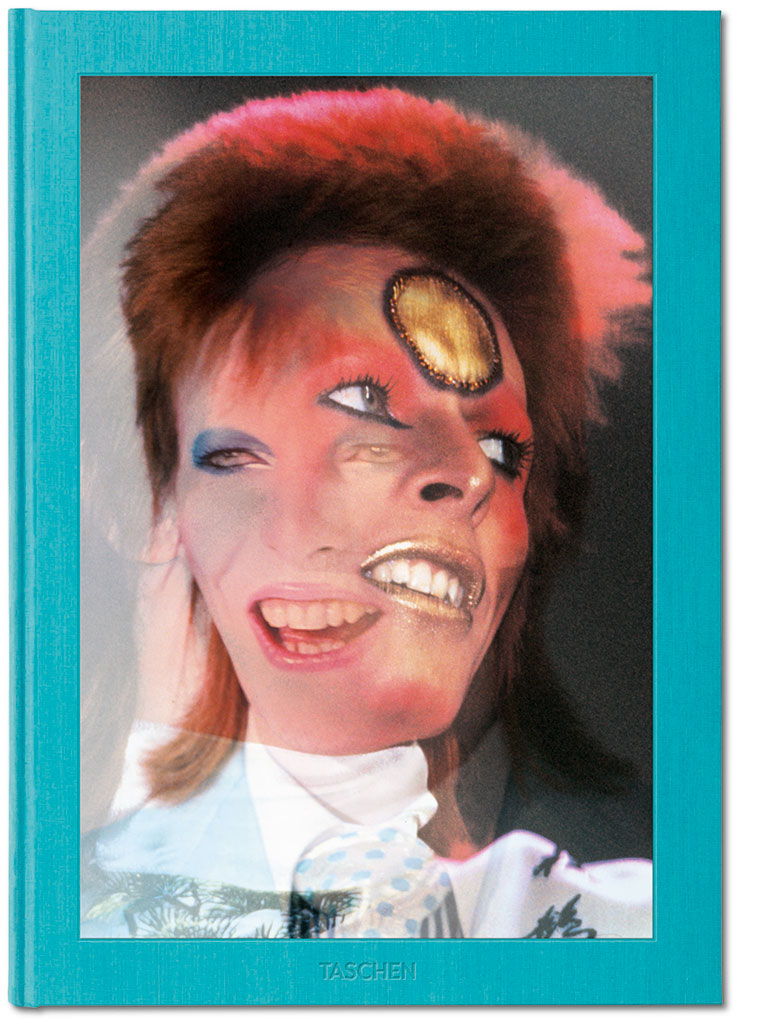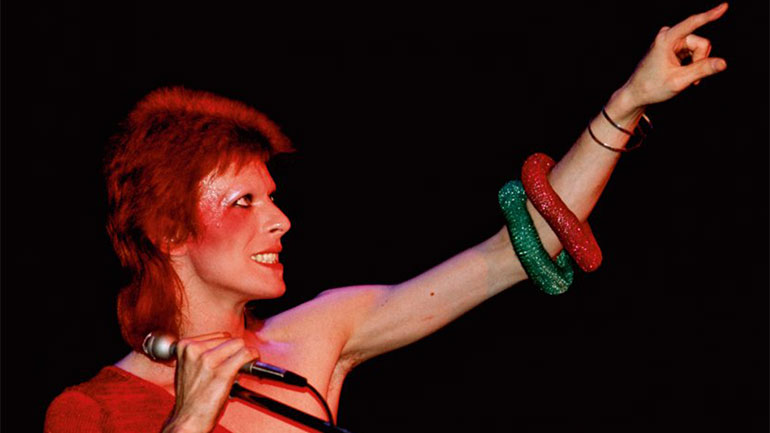Mick Rock On David Bowie: “He Hypnotised Me”
Glam Rock’s Cecil Beaton on Bowie’s Ziggy transformation, as revealed in his Taschen super-book.

Mick Rock’s luscious Taschen tome, The Rise Of David Bowie, 1972-1973, is a stunning tsunami of some of the 5,000-plus images the photographer snapped over Bowie’s iconic and career-making Ziggy Stardust period. Purchasers of MOJO magazine’s latest Bowie-themed edition will already be enjoying a special print of one of the previously unpublished images from one of Rock’s earliest Bowie shoots. And anyone with a superfan in their life and a Christmas present hole to fill might wish to explore its source, a labour of love for the photographer.

“Bowie hypnotised me,” Rock tells MOJO. “Maybe it was partly the LSD and partly the yoga I'd started doing. But I had my brain wide open. And there was a little vibe of my friend Syd Barrett in there, too. When we started to talk he was very intrigued by Syd.”
What was it like rolling with Bowie in 1972? “Inspiring,” says Rock. “I saw him as a ringmaster, like the Energiser bunny.” Certainly, the singer’s charisma and creative power was at a phenomenal peak...
“David was dabbling in Buddhism,” says Rock. “There are a couple signs of it on Hunky Dory. And he was into some kind of Buddhist projection. He was in a state of total yesness. He tapped into some magic.”
Limited to a total of 1,972 numbered copies signed by David Bowie and Mick Rock, The Rise Of David Bowie is available as Collector’s Edition (No. 201-1,972), and also in two Art Editions of 100 copies each, with a pigment print signed by Rock. Each boasts a striking five-way lenticular cover, whose images appear to follow you around the room.
Rock is particularly pleased with how the cover turned out: “It swings any way you want it to, darling, ha ha!”
For more about The Rise Of David Bowie, 1972-1973, go here.
 ." width="770" height="506" align="none" style="width:770px;height:506px;margin-top:10px;" />
." width="770" height="506" align="none" style="width:770px;height:506px;margin-top:10px;" />
For more Mick Rock on David Bowie, read on...
------------------------------
MOJO: How aware of David Bowie were you?
Mick Rock: I was vaguely aware of Space Oddity, but I think I probably regarded it as a gimmick record, which in a sense it was. A bit later I was frequenting the Oz magazine offices on Great Newport Street, using their darkroom. I remember popping in to [co-editor] Felix Dennis's office and he had a pile of records on his desk, each with a hole in the corner of the cover, ’cos that’s how they used to differentiate the promo ones, and he said, Help yourself. I grabbed two or three and one of them was *Hunky Dory. And I played that f***ing record – specifically Life On Mars – till I f***ed it up. So I had to actually go out and buy a copy.
“By the end of it, he almost became Ziggy. Became trapped in the character.”
Mick Rock
And what do you remember of your first meeting?
He was instantly charming and he had a very "up” vibe about him, as he always did in those years. I felt that positive force in him from the beginning. Compare him with Lou Reed – who David actually introduced me to – and that was a much murkier, you could say subterranean vibe.
The first thing David said to me was, I like your name. Of course the joke being that my name is actually my name, whereas David Bowie… well he had to distinguish himself from Davey Jones from the Monkees, didn’t he? But Bowie’s such a great name...
There are so many pictures, the book can’t help but project a theme of transformation. You can see him incrementally inhabit the Ziggy character...
Yes well, for that 20 month period I have about 5,500 pictures and I’ve counted 74 different outfits. Some of them he only wore once – like the one he wore in the Life On Mars? video. By the end of it, he almost became Ziggy. Almost became trapped in the character.
The volume of creative decisions is stunning...
He was moving very fast. And he was always sucking up information. That was another amazing thing. You’d say something to him once and he’d catch on and process it into his mischief. It was a magical moment, especially that summer of ’72. Starman, then All The Young Dudes for Mott The Hoople, then the album. David was just rising. That gig at Oxford Town Hall [site of Rock’s famous guitar-fellatio shot – June 72], I think that was his biggest show to that point, maybe a thousand people there. I think that was his first time in four figures. After that it was... romper room!
Do you think being a writer as well helped you sniff out the story, perceive the narrative?
I do – because I wasn’t just running in taking some pictures and running off. I was spending time with him. I did an interview with him for Rolling Stone, and another for Club International, who were trying to do what Playboy had done, with the cultural section before you got to the boobies and bottoms. That was where that picture of him in the mirror first showed up.
“I wasn’t very interested in being a realist. I was interested in what he was projecting.” Mick Rock
There’s lots of candid stuff in the book. He didn't mind you seeing him put the mask on...
I love how mundane the surroundings are. He’s in the wild, one-legged Kansai outfit but he’s in this grotty dressing room having a fag. Or drinking something out of a paper cup. This exotic creature! Then again, I wasn’t very interested in being a realist. I was interested in what he was projecting. That’s what excited me. That’s what I photographed.
There’s also a sensuality. Some of these shots are like a ballerina getting ready...
He was very connected to his body. His apprenticeship with Lindsay Kemp gave him a lot of confidence in that regard. How many rock stars had studied mime? He was influenced by so many things: including The Living Theatre, including Jacques Brel, including the Velvet Underground; including Iggy – Iggy is Ziggy; Marcel Marceau; Stanley Kubrick. He shared a birthday with Elvis Presley, too.
He was brave – committed to the look, the attitude...
He had a lot of balls. It was an entirely different universe, then. The broad public were quite antagonistic towards what he was doing. This was 42, 43 years ago, but what he was doing then is still ahead of the game – notwithstanding Lady Gaga and all these characters.
Did you ever think, this isn’t going to work?
Not really. One thing he said to me early on: ‘Mick, I’m so focused on this.’ You gotta remember how unhip it was to talk about being a star. This was 1972, the vestiges of hippy: tune in, turn on, who gives a f**k...
But he did give a f**k. He was focused on the quest for... for fame and glory. He said, ‘If you came to me and told me that my best friend had just died, I'd probably go, Oh, what a shame, that’s terrible... then I’d go straight back to work.’ Now, obviously, his best friend *hadn’t just died and he was talking theoretically, but that illustrates his frame of mind. No, I never saw any wavering. When he made Ziggy Stardust he wasn’t a star, but it was all about projecting stardom. He wanted it. Huge.

